by Ezili Dantò
Gold Rush in Haiti: Good for whom?
(See also Haiti’s Riches and December 21, 2012 update: Haiti Awards Gold, Copper Mining Permits )
*******************
Haiti ‘s water supply is ALREADY contaminated by foreign cholera feces, what will leaking cyanide, arsenic emissions, mine waste, Marine ecosystem destruction and open pit mining and unsupervised drilling leave Haiti with up North?
Will the new propose mining laws being drafted by the Martelly government provide MORE legal protection for Haiti? Or, will they simply void the protections that are on the books already but not applied?
What will be different in the new laws and what will the effect be for the people in Haiti?Will Haiti ecosystem, crops, water supply be duly protected. How? And how will the displaced farmers and Haiti in general profit from these new laws? WHO is drafting these laws?
Why isn’t the new mining law conversation PUBLIC and soliciting Haiti legitimate public participation.
Haiti: Waiving current law to benefit the global miners and readying bullets for peasants who will protest the looting
Waiving the current law to benefit the global miners and readying bullets for the peasants who will protest the looting is probably the reason the neoDuvalierist Martelly government is suddenly drafting new Haiti mining laws.
HLLN on Haiti Riches
(in Kreyòl) 2009: Ezili Dantò with LakouNewYork on Haiti RichesHaiti Riches: Lakou New York Interview with HLLN’s Ezili Dantò (Kreyòl) with Dahoud Andre and Manno on environmental degradation concerns of post-coup d”etat gold/copper mining in Haiti by foreign companies, May 6, 2009 (in English) 2009: Ezili Dantò with Chris Scott- CKUT Interview on Haiti RichesHLLN four weeks after the earthquake
|
Haiti’s current law doesn’t allow drilling without a signed mining convention. But Newmont mining got a “waiver” to the current law. Former Minister of Finance Ronald Baudin along with the Minister of Public works helped Newmont and Majesco mining get the unlawful waiver.
Not that the foreigners have not been digging, drilling and extracting Haiti gold and mineral resources clandestinely since the 2004 Bush regime change and clandestinely exporting it out of the country behind UN barricades, private security planes and logos anyways. It’s just that now they’ve gone public, a semblance of following Haiti laws seems necessary. (The secret behind the Rush to Haiti; All Eyes On Haiti: One Of The Reasons Why The US/UN Rush To Haiti ; Haiti’s Riches:Interview with Ezili Dantò on Mining in Haiti.)
Dieuseul Anglade, the then head of Haiti mining objected to the “waiver” charade and was fired by the newly installed prime minister, Laurent Lamothe.
This is not new, as I reported in 2008 in an interview with Chris Scott:
“in terms of regulation, what happens, nobody knows. The Bureau des Mines…I’ll give you an example, the head of the Bureau [of Mines] is Mr. Anglade. And around that same time he talked about, not mining companies, but there was an issue where there was an underwater exploration in Ile-Ã -Vache, which is an island in Haiti, somehow there was a dispute between the company and the Bureau des Mines and what happened was, out of the blue, someone, somewhere decided to move the contract away from the Bureau des Mines and put it into the Minister of Culture.”(Haiti’s Riches:Interview with Ezili Dantò on Mining in Haiti; The secret behind the Rush to Haiti.)
What other waivers did Newmont, VCS Mining-Majesco, Marien mining, et al… negotiate with the newly minted Washington government in Haiti? Perhaps a waiver of the 50%/50% sharing of profits or maybe no royalties to Haiti for 30-years? Ronald Baudin who helped Newmont and Majesco get to drill without a fully negotiated and signed convention with Haiti now works as a consultant for Newmont-Eurasian.
Tieramerica writes on Global Research:
Backroom deals, legally questionable “memorandums”, and test drilling carried out with no public scrutiny and little government oversight are all part of the new gold rush in Haiti.
Tieramerica quotes Dieuseul Anglade, a “well-respected geologist who headed the state mining agency for most of the past 20 years:”
“Minerals are part of the public domain of the state,”…. if tougher laws and better contracts with the mining companies aren”t written, it would be better to “leave the minerals underground.”
Part 1 of Foreign Investment means Death and Repression: A Historical Perspective, explains:
“…Caracol job-for-Haiti (is) bait to provide infrastructure and housing for the Denver-based miner Newmont (Eurasian/Marien Mining), Canada’s Majesco/VCS Mining and other foreign companies mining Haiti for gold, silver, copper, worth more than $20 billion dollars.”
The New York Times focuses on the eviction of farmers for a factory complex just nine miles down the road from US mining operations worth $20 billion. What about the farmers evicted for Newmont and Majesco to mine for gold at the mining royalty rate on mineral resources is 2.5% to Haiti, which is the lowest in Hemisphere. Will this help Haitians or just the foreigners?
People all over the world, where Newmont has active mines, from Nevada, Indonesia, Australia, New Zealand, Ghana to Peru, are mad about Newmont and the gold mining industry. The Akyim indigenous community in Ghana has launched a world campaign to protest against Newmont. This week five protesters died in a clash in Peru over the Newmont mine. In the US, Newmont mining is accused of not paying Nevada taxes.
If the powerful Newmont conglomerate is not paying tax on mining profits in Nevada, USA, how reasonable is the expectation it shall pay the negotiated Haiti 50% profit tax or even the lowest 2.5% royalty rate in the Hemisphere to vulnerable Haiti?
Haiti is severely deforested, just suffered the worst earthquake damage in world history and its fragile water supply is ALREADY contaminated by foreign feces- UN-imported cholera from 2010.
What will leaking cyanide, arsenic emissions, mine waste, Marine ecosystem destruction and open pit mining and unsupervised drilling leave Haiti with up North?
The Times article doesn”t make the obvious correlation, nor mention the ecological concerns with the mining, just talks about Caracol Bay and Fort Liberte ecological concerns.
Most telling is how the Times article notably fails to mention, simply skips the obvious – Haiti’s vast (an Olympic pool to Venezuela’s glass of water) oil reserves in the North, its connection to the Caracol project.”
*
(For full report, go to Part I: Foreign Investment means Death and Repression: A Historical Perspective)
******************************************
Forwarded by Ezili’s Haitian Lawyers Leadership Network
******************************************
Washington Justice For Haiti:
In support of Paul Farmer’s pharmaceuticals and the Farmer groups – Brian Concannon/IDJH – asking the UN to judge itself guilty on behalf of Haiti cholera victims, Washington Post opines, justice for the Haiti cholera victims would be collectively awarding $40million to Paul Farmer pharmaceuticals for cholera vaccines – Ezili Dantò on Washington Post editorial supporting expansion of Farmer’s ineffective cholera vaccines
********************
BACGROUND INFORMATION
********************
Haiti’s Riches:Interview with Ezili Dantò on Mining in Haiti
Recorded in 2008 – interview with Ezili Dantò
Interview with Ezili Dantò, before the global elites acknowledged Haiti Riches, before the contamination of the Artibonite river by UN cholera bacteria
*******************
*******************
HLLN Transcript (with added reference links) of CKUT Interview with Ezili Dantò on Mining of Haiti’s Riches, transcribed for HLLN by The Zen Haitian
Host: Chris Scott
Guest: Ezili Dantò
Recorded: April 29, 2009
Listen to the audio – Haiti Riches: CKUT Interview (34:03) with Ezili Dantò on Mining of Haiti Resources and Riches by Chris Scott for CKUT (90.3 FM) in Montreal, Recorded April 29, 2009
Ezili Dantò
HLLN TRANSCRIPT (with added reference links)
Chris Scott: …This is Chris Scott for CKUT radio 90.3 FM Montreal interviewing Mrs. Marguerite Laurent[/Ezili Dantò] with the Haitian Lawyers Leadership Network (HLLN). Ms. Laurent welcome to the program.
Marguerite Laurent/Ezili Dantò: Thank you. Thank you for having me.
Chris Scott: Thanks. We wanted to talk today… and I understand your organization has been following the issue of foreign mining companies coming to Haiti and prospecting. Especially in the North of Haiti. There are now at least three Canadian companies prospecting for gold and copper in Northeast Haiti and two of these companies have really expanded their operations within this past year. Why the rush to start mining in Haiti right now or to start prospecting in Haiti , right now, in the middle of a recession of all things?
Ezili Dantò: Hah, well perhaps because Haiti right now is under occupation and the people, their voice is not being heard. This is a very good time for foreign companies to be granted concessions, because the folks in office are not representing the people of Haiti.
Chris Scott: UHmm. And I guess you’ve talked about the fact that these companies obviously, they look for what they call a “secure business climate.” For presumably a low regulatory environment. Can you describe a bit more for listeners what the situation is for regulation in Haiti right now? Because Haiti does have officially an elected government, but the country is also under occupation. What happens on the ground? Who makes the decisions? Who calls the shots?
Ezili Dantò: Well, technically with regards to mining there is this thing called the Bureau of Mines [and Energy] and its under the Ministry of Public Works in Haiti. But what folks have to understand is the history of what’s been going on with respect to Haiti. Between 1991 and 1994 there was a Coup d’etat. It was – 91 was the first Coup d’etat against President Jean Betrand Aristide and in those times, foreign companies, whenever, during Coup D’etats they get lots of concessions and so forth. In terms of Haitian mineral rights and gold and bauxite, all the various minerals of Haiti. I mean people don’t think of those things about Haiti. And this is one of those things my organization want folks to understand. That the UN is not in Haiti, the US is not in Haiti, Canadians are not in Haiti for humanitarian goals or because they care about Haitian rights. There is an economic track. And so I’d like to be able to explain to your audience that in terms of the economic track. Haiti has various sites, especially in the North, where in terms of Canadian companies, were talking about St. Genevieve, were talking about Eurasian Minerals, were talking about right now the new one that just came which is called Majescor. Those are the three we are aware of. That doesn’t mean there are not others.
But around the 1970s and 1980s there was a survey[s] -[1975 – Kennecott Exploration/1978 – Penarroya Exploration], a geological survey done by the UNDP [1983 – The United Nations Development Program], and they actually also put together a document [for the Haitian government] with respect to what is available in these areas. In these areas now that are being mined by Eurasian Minerals; that are being mined by St. Genevieve up in the Trou du Nord up in the North and Northeast of Haiti. These companies, specifically St. Genevieve, came into Haiti in 1997 and that was under the Lavalas government of President Preval. And they got a [minimum] 25 year contract. Now, when they got that contract with regards to Haiti this was during a time when the grassroots had their voice. They knew what the resources were in Haiti and they felt entitled to share in the profits.
We have information where St. Genevieve was talking about how, you know, the Aristide government was not amenable to what it was doing in Haiti. [Editor’s Note: “Steve Lachapelle – a Quebec lawyer who is now chair of the board of the company, called St. Genevieve Haiti – says employees were threatened at gunpoint by partisans of ex-president Jean-Bertrand Aristide. The president at the time, René Préval, once an ally of Aristide, was elected for a second term last year, but Lachapelle says he has renewed confidence in the Haitian leader.”] But now, these companies are having a great time. Once the Coup d’etat had happened in 2004. There is no longer a worry about the people. Because the people, their voices are not being heard. Although we have an elected government that was… excuse me, an elected President. The rest of the folks are Coup d’etat folks that have been left over or they are the folks that the parliamentary elections where the people really concentrated just on trying to get themselves out of, between 2004 and 2006, intense, intense repression. Trying to get a government, or a president that they thought would represent them. But the Preval government is effectively at the moment a puppet government that’s under occupation. So, that’s why you see the most exploration licenses being given out. In January, Eurasian Minerals, a Canadian company got 27 licenses. We know that in 2005, during the Latortue imposed government, after the coup d’etat, that St. Genevieve they reaffirmed their license.
Now, in terms of regulations, what should people think about, when – if a company says they are having problems with the democratically elected government in 1997, but in 2006, excuse me, in 2005 after that government has been ousted, their contract, their 25 year contract is being reaffirmed and now they are having a great relationship with the occupiers of Haiti. What folks should understand is this, now I don’t have the specifics with regards to the St. Genevieve contract, this Canadian company. But I do know that they have, they’re up there in the North and Northeast. Folks should understand, that when a Coup d’etat happens like the one that happened in 2004. And these folks that came in from the Dominican Republic who are supported by the United States and all these Neocons who wanted to get President Aristide out, the first thing that happens is that all the archives are destroyed; set fire to all the original archives, so that the elites, and the foreign companies who may owe money to the Haitian people, the Haitian government, they sometimes get away scot-free when the new imposed government comes on without paying anything. So who knows what data from the first contract under Preval was taken out with regards to this 25 year contract that’s St. Genevieve’s. Nobody knows. All we know is that the St. Genevieve company reaffirmed its contract under the occupation and added five more additional permits. So, in terms of regulation, what happens, nobody knows. The Bureau des Mines…I’ll give you an example, the head of the Bureau [of Mines] is Mr. Anglade. And around that same time he talked about, not mining companies, but there was an issue where there was an underwater exploration in Ile-Ã -Vache, which is an island in Haiti, somehow there was a dispute between the company and the Bureau des Mines and what happened was, out of the blue, someone, somewhere decided to move the contract away from the Bureau des Mines and put it into the Minister of Culture. [See, The General Director of the Bureau of Mines and Energy struck by the announcement of the plunder at the sea-beds of Ile-Ã -Vaches ].
So these are some of the weaknesses of the Haitian regulatory system. Number one you have these Coup D’etats, where what was done when there was a government of the people, we don’t know what was reaffirmed in 2005 under the occupation. Also we don’t know who is regulating whether the properties [property owners] are being paid for that these people are excavating. Whether the laws that require Haitian ownerships are being followed. Because a lot of times these foreign companies have enough leverage to just buy a name, a Haitian elite, a person, give them some money. And, in effect, who is going to…there is no serious enforcement of those subsidiaries they have to do that have Haitian participation. Also, the Bureau of Mines with the various chaos going on; who is going to look at these contracts and enforce, for instance, whatever the guarantees were that the underground water, or the surrounding farming areas, or the air pollution, what happens, cause everybody knows the environmental devastation that happens with mining, the chemicals that are used in the air. Obviously, everybody also knows the wind levels when Haiti has hurricanes. Like the devastating hurricane we just had recently that leveled the whole of Gonaives. What happens when oxidation and all these various chemicals get, you know, travel up in the air. Who will be responsible? Will these foreign companies have any responsibly for the health hazards that may happen? We know because we are under occupation that there is frankly no regulatory framework that will enforce laws or even contracts. These contracts, the so-called conventions with the Bureau of Mines, that St. Genevieve, Eurasian or Majescor have, the people of Haiti don’t know about them. That’s basically what’s happening. If there is, for instance, the guarantee that once they have dug up these mines and so forth that they are not going to leave the area devastated. That there are some sort of reparations fixing the area, and if there are some damages, that there is some sort of money put aside for those damages. Nobody knows any of this stuff.
Chris Scott: You mentioned earlier in your talking that some UN personnel, or peace-keepers I guess, with the MINUSTAH have actually been providing logistical support and in some cases been providing security to these mining operations in some of these remote areas. Is that true?
Ezili Dantò: Absolutely. We have reports all of the time, we have this project in Haiti called the Ezili Dantò Witness Project, we get reports from the various locals. The latest one, a couple of months ago, was in Port-au-Prince, where we were told, that the UN soldiers came in, now I have to say, that most Haitians, they’ll call anyone a UN soldier, if you have a gun, it could be some geologist or someone at a private security. The point is, the UN soldier come in, they cordon off the area, put big containers in. And folks tell us that they can’t see what is being dug [up], they can’t see what’s going on. They might stay in that area for a month, they might stay for a few days. Whatever they are doing, the folks that are the authorities cannot explain to their constituents what’s going on. And so that’s one of the things that’s been happening all over Haiti. All over Haiti. I have an example of somewhere in the North, a mayor there that I spoke to a while ago, basically said to me; UN troops came into his town, started digging, cordoning off areas, and when he went to them with a delegation of the townspeople, and said, I don’t know what you are doing here, I am the mayor I’m the authority here. They said, well listen, we have authority from Port-au-Prince. And they didn’t produce any sort of paperwork. So do these foreign companies actually have the consent of the people at the moment ? I would say they don’t, for doing what they are doing.
Chris Scott: Is it your sense that the laws, in terms of environmental protection, in protecting communities that are near mining operations, is it your understanding that the laws just aren’t applied? Or is it the problem that the laws just don’t exist? Or do we even know at this point?
Ezili Dantò: The laws exist. Whether they’re adequate? We don’t know. Whether they’re being applied? That we know, they are not being applied. Because if the people themselves don’t know what’s going on. And if the people themselves don’t know what their rights are, or who the folks that are coming in are. Then that means, whatever those laws are, the mayor can’t, you know, say that this X, Y and Z law requires that you get in touch with me first, that I know what’s going on, that I am able to protect my people. But none of that happens. So whatever the law is, and I know that on paper there are certain environmental laws that Haiti has. But on paper. Just like on paper there’s supposed to be some sort of Haitian participation. But, you know, it’s all window dressing. At the end of the day, they’re not being enforced. And as I said, ways of not enforcing it is destroying the archives. So that nobody knows who owes what, or nobody knows… and then redo the data. Redo it under occupation. So, that’s basically it.
But folks have to understand, the Haitian people had experiences before, with let’s say, the bauxite, where Reynolds Aluminum was in Haiti for a long, long time and after they left the place was just a crater. The people wanted to know… I mean, we didn’t benefit.
Chris Scott: What years are we talking about?
[Editor’s Note: Reynolds Aluminum was in Haiti for over 20-years and closed and abandoned its bauxite mine in 1982. Click here for some photos of the old Reynolds Aluminum facility, dock, port, airport in Miragaone, Haiti and info on the 2004 purchase of the old Reynolds facility during the UN occupation and return of the wealthy elite’s rule of Haiti.]
Ezili Dantò: I mean, it was in the seventies. So now when, see there was an education process in Haiti. For the first time we had a democratically elected government. And I remember that in 1999 when President Aristide was campaigning, for his second term, for the first time the people were given what this Lavalas party was going to do and it was called the “White Book.” And in that book there was a list of all the various minerals and sites. And it’s on my website. There is a map that shows where the various minerals are. So that between 1991 and 1994 [Note: – 1991 to 1994 are the dates of the first coup d’etat, this date here should instead be “between 1994 to 2004”] when the people had a voice in government, there was an intense grassroots movement to figure out how they could use Haiti’s resources. There was a plan, where the Lavalas government, not only told the people where the resources were, but that — they did not have the skills and technology to actually extract the gold, to extract the oil… Their plan was they were going to engage in some sort of private/public partnership. Where both the people’s interest would be taken care of and of course the private interest would take their profits. But I think it was around that time we had St. Genevieve saying they did not like the Haitian government. Obviously, they didn’t like this plan. They don’t like the Haitian people to know where their resources are. But in this book, it was the first time in Haitian history, it was done in Kreyòl and in French. And there was a national discussion all over the radio with respect to all these various resources, where they were located, and how the government was intending on trying to build sustainable development through those resources. So that’s what you had before the Coup D’etat. With the Coup D’etat now, though the people know where these resources are because this book exists, they don’t know who these foreign companies are. What they’re profit margins are. What the environmental protection rules and regulations to protect them are. Many folks, for instance, in the North talk about losing their property, having people come in with guns and taking over their property. So that’s where we are.
Chris Scott: Ms. Laurent (Ezili Dantò), you’re a lawyer. You, I understand work on this full time. And I understand its a big, big, big problem. But do you, are you able to do something in terms of the Lawyers Network? Are you able to go and do access for information request? Or something similar? Are you able to actually go on site and get some information or take testimony from people. How does someone who works on this full time try to shed light on what’s actually going on?
Ezili Dantò: Well, number one, one of our biggest challenges is to tell the world that the powers that are in Haiti at the moment are not there to so-call “protect Haitian security.” They are there securing an economic track. They are there trying to secure their privatization, their neo-liberal agenda, their sweatshops and their use of Haitian resources for their major conglomerates, and Haiti’s oil resources. And as I said five [oil] sites, and that’s not even including stuff that’s in water [offshore.] So that Haitians are aware of with respect to own country. [Editor’s Note: For instance, Cuban territorial waters flow into Haiti waters. See, Cuba oil/gas prospects and contract with Brazil for offshore drilling]. We, as an organization spend most of our time actually trying to uncover the information. We have asked the Bureau of Mines for, let’s say, the contracts. We are ignored, obviously. We’d like to see the conventions that has to be signed, between the companies, like St. Genevieve and the Bureau des Mines and Energy in Haiti. We don’t get those things. We are pushing, obviously the various political figures, that are interested in the people’s rights, to ask for these contracts. To find out what’s going on. So that’s one of the things that we do. But the primary stuff is just to establish that Haiti has resources. I mean, the colonial narrative is that Haiti is so poor, its a beggar country, and it doesn’t have any resources that possibly Canada and these Canadian companies could want to go into Haiti and excavate for. So that’s why programs like yours are so important. Because we get to tell the world that Haiti has gold. As a matter of fact, you know, there was an article that talked about Haiti is littered with gold. That Haiti has copper. That Haiti has silver. That Haiti has all these various oil sites. That behind the UN gun, something is happening.
Chris Scott: Yeah. And maybe, you could just tell us just to make it explicit, the people that you’re dealing with, that you are communicating with in the North of Haiti and elsewhere. What are the concerns they have about the way exploitation is being done? In terms of having their properties trampled, I can understand that very clearly. But in terms of some of the longer term, some of the environmental affects, what have they communicated to you?
Ezili Dantò: Well you know, the kind of interesting thing is that , a lot of the folks, they don’t know. They really don’t know, some of them, that the extraction of gold and copper and so forth has this cyanide process, or this process that when it hits the wind, you have all the various poisons in the air that will cause public hell. The geologist, the Haitian geologists knows. And they publish papers and we’re working with them, in terms of the educational process, to let the folks know, you know, all the chemicals for instance deep in the veins of the rock when those chemicals go and they seep through, you have this possibility of, you know… Haiti is a country that’s so fragile already. Everyone knows that deforestation is a problem. Everyone knows that the last hurricanes destroyed the whole city of Gonaives. Which is almost about 350,000 people were rendered virtually homeless. There was a billion dollars in damage and this was because of the deforestation. But imagine now that you have companies digging into the mountains of Haiti and leaving these craters and leaving these…
Chris Scott: Toxic chemicals.
Ezili Dantò…lethal sorts of illnesses, to the farmland, livestock, the water, the air that the extraction process will, you know, the leaking cyanide and other chemicals used in the extraction process will affect nearby farmland and the livestock and so forth.
So we don’t have any reports yet with respect to those things. As I said, you know, our resources are very limited. What folks have been talking to us about are the UN coming in and cordoning of areas, or the “blan” coming in (they call foreigners’ blan) coming in, and setting up their various mining operations. That’s what we’ve been told. We have not gotten information about livestock devastation right now. Because, everything is sort of… We think things are at a small scale right now. [Editor’s Note: Mining Haiti’s mountains for extraction of raw materials for the construction industry is at a bigger scale and some of it has been steadily going on since before the 1980s, with perhaps Haiti-people orientated oversight/questions posed, only during the 1994-2004 people’s governments. The digging up of Haiti post-Bush Regime Change/Coup D’etat companies has intensified. But it is the poor Haitian peasants use of charcoal for fuel that is primarily blamed for Haiti’s soil erosion and deforestation]. We don’t know to what extent that they’ve actually started their [gold/copper/silver…] excavation processes. Because everything is cordoned off, Haitian’s can’t see in. That’s really all I can say with respect to what’s going on. We can’t, we don’t know what’s going on inside.
All we know is that areas that Haitians were able to travel and go to, right now they cannot go to those areas. So in terms of soil contamination… I can say though, that we have noticed and folks in Haiti understand the difference between 2004 when this coup d’etat happened. As I was saying, we had an empowered constituency of Haitians and grassroots organizations from 1994-2004, and there was sort of an impasse because there was a fight between the companies who had gotten their concessions and the people in congress in Haiti there was just an impasse. Because there was a big discussion as to what these companies were going to be doing and how this was going to benefit sustainable development. But there is no such discussion now.
Right now, all we know is that these companies are getting contract after contracts and the places are being cordoned off. And we can see between the 2004 and the 2008 hurricanes, the actual granite, the actual mudcake on the people’s faces. You can see the difference between a mudslide in 2004 and how much it’s intensified in 2008. We can see the degradation. And its happening because of the digging up of Haiti. Because in addition to these Canadian companies, there are other companies that are digging up Haiti, for construction materials and limestone and all this other stuff – marble. Haitian marble is on the international market a very important and its pure. The purity of these resources in Haiti. The grade of them is so high. Minerals in Haiti the grade of it is so high. Because Haiti is one of the oldest land mass in the Americas. And because Haiti is a land of mountains after mountains, that’s [part of ] what Ayiti [Haiti] means, you have all these minerals inside of these mountains. Our concerns of course is what’s going to happen to the ground water. What’s going to happen to the air? What’s going to happen to the people? What are the profits? You know… and what guarantee do the people have that there is going to be any sustainable development, beyond some temporary jobs for miners? Because we know in the process of gold and copper mining they need a lot of water. Haitians wonder, where are they going to get them from. Are they going to build these dams. Who’s going to enforce that there’s no big accident, like that happened in 2000 in Romania, where one of these mining companies just leaked out these chemicals into the river. The Artibonnite river is not that far. And it’s where Haiti’s breadbasket is. If that’s contaminated, what are we going to do? But there’s no discussion of any of this in Haiti right now. Whereas under the democratic government there was intense discussion of these issues.
Chris Scott: If Haiti regains its sovereignty at some point in the future. What is the way forward? In terms of mining it, you’d still be dealing with these companies which are very cynical. They’ll try to get the best deal they can and damn the consequences. Will the sovereign Haitian government still have to deal with these companies? Will they try to mine in some way on their own? Will they deal with companies like Cuba, perhaps, who have a different experience with dealing with foreign capital? What is the way forward for Haiti from here on in?
Ezili Dantò: Well, the way forward, number one, is for Haiti to get back its sovereignty. And I think there was an intense discussion between 1994-2004 and I think this discussion needs to be put back, that’s what democracy is about. I think that the plans the Lavalas folks had in their White Book, where there is a just partnership between the private sector and the public and the government. So that the skills necessary, for instance, to do safe extraction are applied, and to protect the people are applied – with the understanding that a private company is going to want its profits, but also with the understanding that the Haitian people have an interest. Right now the only thing that anybody is dealing with is the profit of the foreign companies, nothing with respect to the interests of the Haitian people for sustainable development, for health, for their right in terms of the ownership of the property. There’s none of that. We obviously need to have an engagement with the private sector who have the skills and the technology to extract these minerals, but in such a way that the voices of the people are heard. That the environment is protected. That there’s guarantees, financial guarantees, that if something happens these companies will be liable. They can’t just jump off and go someplace else and leave some sort of a degradation.
But I think you are correct, with respect to, its been done its being done in difference places. And we have to look at those places. We have to look at folks who are friendlier to human development. I think that’s what the White Book was called: “investment in humans and the environment.” [Note: The actual book title is – Investir Dans L’Humain: Livre Blanc de Fanmi Lavalas sous la Direction de Jean-Bertrand Aristide]. And Cuba, Venezuela and these folks who seem to be interested in their human capital are good partners. And could be good partners for us at some point in time. Yes, I think that is something… ‘Cause right now, there is a need, for instance, for fuel in order to run these mining companies. What are they using? And how are they using it? If we can leverage this into infrastructure for the larger surrounding community, then that would be good. Not just these companies come in, they build a dam that only they use for their extraction process and so forth and the community is left with no development. But if we can have an integrated holistic system where they come in and there is a development plan for sustainable development for sustainable economic jobs that are going to be beyond this arena – for water, clean water, for electricity. Something where we work in partnership is what I think the Haitian people want. It’s what they need. It’s not that they don’t want to see foreign companies in Haiti, it’s that they don’t want the companies to manipulate, so that you know every time we take one step forward, they bring us three steps back with a coup d’etat, destroy all the work that was done that put in some protection for the people, and then go back to just their profits.
Chris Scott: We were speaking to Marguerite Laurent[/Ezili Dantò] with the Haitian Lawyers Leadership Network in New York City I believe. Yes. That’s correct. Is there anything else you’d want to add before we finish the interview Ms. Laurent?
Marguerite Laruent/Ezili Dantò: Yes, folks who are interested in really understanding the counter-colonial narrative, that’s what we specialize in. And especially we want folks to know that Haiti has resources. That it’s because of these resources that you have companies like Eurasian Minerals, St. Genevieve, Majescor… and you have the Ottawa Initiative that’s basically is being played out today, where the Haitian President is like third or fourth in line in terms of who has anything to say anything about Haiti. Seems the first person in line these days is Ban Ki-moon and then Paul Collier and whoever comes in from the international community that somebody calls expert. And so we want Haiti’s sovereignty back. We want Haitian resources to be used in such a way that it helps with long term Haitian development. And we want the folks to understand that there are five oil sites that have been documented with regards to Haiti. We want the folks to understand that there are reports from the UN that says that Haiti is littered with gold and copper and marble and limestone. And that there are various projects going on right now behind these UN guns. And nobody knows what is going on because there is no transparency. There is no representation for the Haitian people.
Chris Scott: Ok. Thank you very much. And we’ll definitely be speaking to you about this sometime in the future. Thank you Ms. Laurent.
Marguerite Laurent/Ezili Dantò: Thank you very much.
*
END OF INTERVIEW
************
BACKGROUND LINKS:
Listen to the audio – Haiti Riches: CKUT Interview (34:03) with Ezili Dantò on Mining of Haiti Resources and Riches by Chris Scott for CKUT (90.3 FM) in Montreal, Recorded April 29, 2009

Ezili Dantò, HLLN
Lakounewyork interview (in Kreyòl)
Haiti Riches: Lakounewyork Interview with HLLN’s Ezili Dantò (Kreyòl) on environmental degradation concerns of post-coup d’etat gold/copper mining in Haiti by foreign companies, May 6, 2009
A map showing some of Haiti’s mining and mineral wealth, including five oil sites in Haiti
HLLN on the causes of Haiti deforestation and poverty
Haiti’s Riches – expose the false stereotypes
Is the UN military proxy occupation of Haiti masking US securing oil/gas reserves from Haiti
Les recherches pétrolières bientôt relancées en Haïti
Drill, and then pump the oil of Haiti!
Microbe discovered in Haitian soil may develop super-antibiotic drug
Haiti’s future glitters with gold
Expose the Lies of the International Community about Haiti, its people and resources
New Preval Government Denounces Heritage Looting
‘One Step at a Time’: An Interview with Jean-Bertrand Aristide
The Counter-Colonial Narrative on Deforestation in Haiti
Ezili Dantò on Help for the Hurricane Victims in Haiti
*******
Haiti Awards Gold, Copper Mining Permits
Haiti’s government announced Friday that it has awarded permits for the first time in the country’s history to allow two companies to openly mine for gold and copper.
The nation’s mining director, Ludner Remarais, said he hopes the move will bring a badly needed burst of money to the impoverished Caribbean country of 10 million people where many live on a $1.25 a day.
Remarais issued a gold and copper exploitation permit to SOMINE SA, which is jointly owned by Canadian company Majescor Resources Inc. and Haitian investors. Remarais issued a second gold exploitation permit to VCS Mining LLC, a North Carolina-based mining company with offices in Haiti.
“It allows us to finally produce and make money, at least get to that step,” Majescor CEO Dan Hachey said in a phone interview. “It’s also a great step forward for the mining industry in Haiti.”
The company still has to submit a preliminary environmental assessment, although obtaining the permit is the final step to allow open-pit mining, Hachey said. He added that a deadline hasn’t been set.
The company will do additional drilling to better determine where the minerals are located, Hachey said.
“You want to see how far these deposits are, how broad, how wide, how deep, how long,” he said.
Hachey said the company expects to invest about $75 million to get to the production stage for gold mining. He added that It will take hundreds of millions of dollars more to reach the production stage for copper mining, which he described as more difficult.
SOMINE engineer Michel Lamarre said he expects exploration to start in 36 to 42 months, adding that the company has already spent $10 million in research.
VCS CEO and Chairman Angelo Viard said in a phone interview that the company will start open-pit mining within two or three years.
“We are going to do things the right way,” he said. “We are not going to rush. Our number one priority is the environment.”
Viard said that company will likely invest between $25 million and $30 million in the process.
Friday’s announcement comes after U.S. and Canadian investors spent more than $30 million in recent years on exploratory drilling and other mining-related activities in Haiti. In the past year, mining companies launched exploratory drills in Haiti’s northeast region, saying they found precious metals that could be worth up to $20 billion.
”””
Associated Press writers Evens Sanon reported this story in Port-au-Prince and Danica Coto reported from San Juan, Puerto Rico.
Add a comment:
Powered by Facebook Comments

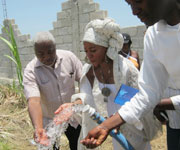

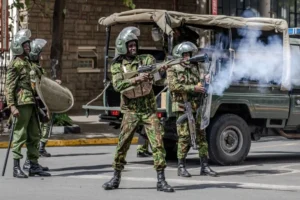

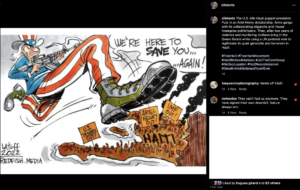
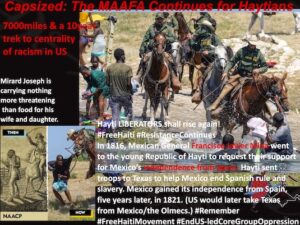

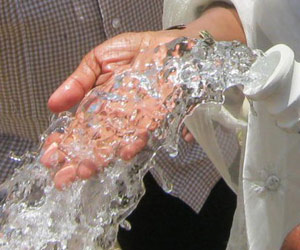
No Pings Yet